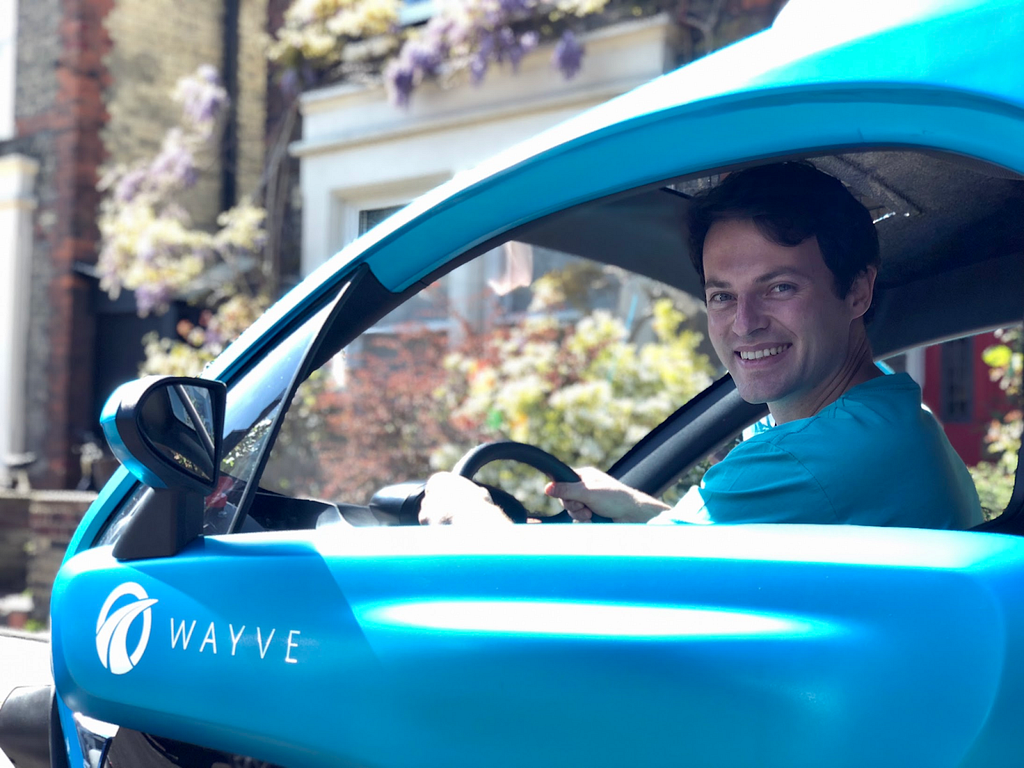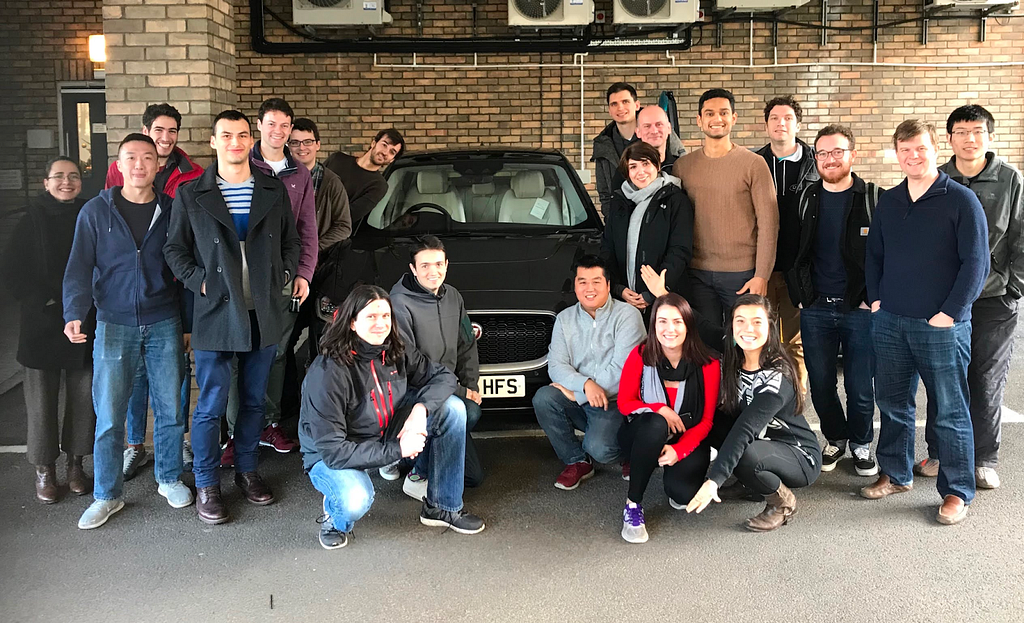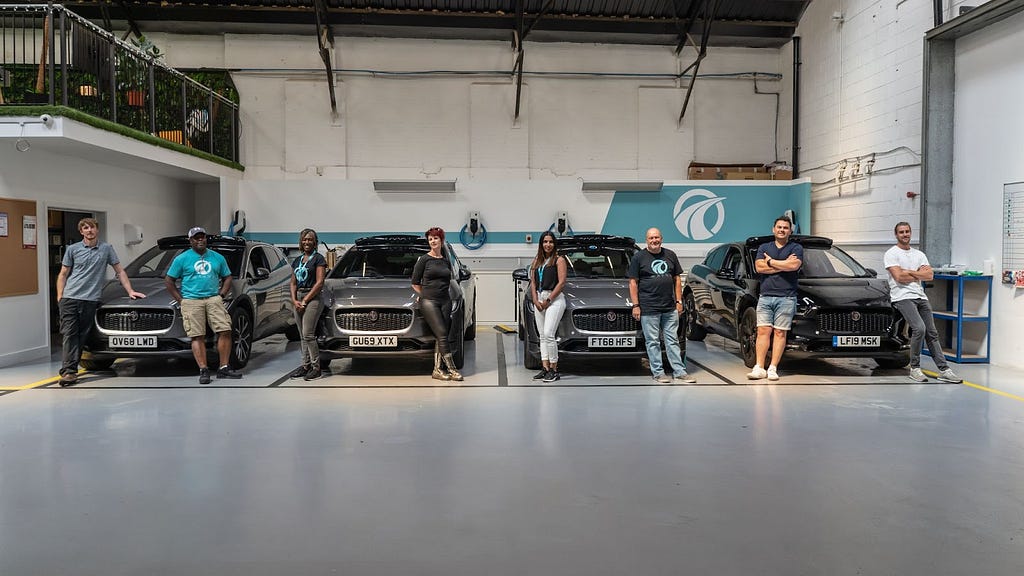In 2017, billions of dollars were being poured into autonomous vehicles. Companies and research institutions were rushing to sign partnerships and money was being thrown in every direction to expand DARPA-era self-driving technology to different business models: manufacturing, licensing, trucking, delivery, and robotaxi.
Many believed the era of autonomy had finally arrived, but while the autonomous driving industry was scaling its traditional robotics stack — which typically relies on an expensive array of sensors and is operationally limited by HD maps and rules-based control strategies — a quiet revolution was happening in machine learning that would turn AV1.0 upside down.
At the time, Alex Kendall, Co-Founder and CEO of Wayve, the first company to deploy autonomous vehicles with end-to-end deep learning on public roads, was studying computer vision and deep learning for his PhD at the University of Cambridge. His team’s award-winning research showed for the first time that it was possible to use deep learning to teach a machine to understand its location and what’s around it, plus critically understand what it doesn’t know. With this breakthrough technology, Alex believed we could move away from predicted prohibitive scaling hurdles, such as HD-maps, lidar and rules-based autonomy, towards machines that have the intelligence to make their own decisions based on what they see with computer vision. It was clear to Alex that the next transformative step was to build embodied AI, which could physically interact with our world. And so, he set out to develop AV2.0: the next generation of autonomous driving — and Wayve was born.
We recently sat down with Alex to learn more about why he was “crazy” enough to found a contrarian startup to compete against trillion dollar technology giants, how Wayve is uniquely positioned for success by having its HQ in London versus a more traditional location like Silicon Valley, his top fundraising tip for other founders, and more.
Eclipse: Tell us a little about yourself and your background.
Alex: I grew up in the South Island of New Zealand, which meant my childhood was a bit different than most. I was fortunate to grow up climbing mountains and surfing waves around New Zealand. My parents were big mentors for me — entrepreneurs in their own rights. I always felt different from my peers and my parents really taught me to embrace being unique. In 2014, I was fortunate to win a scholarship to Cambridge University in the UK. This was right at the time when artificial intelligence and deep learning were really starting to change the world. I was fascinated with building complex systems and to me, building an artificial intelligence system was the greatest challenge of them all. At Cambridge, I dove into that field of research and made some fundamental discoveries that made it a possibility to build robots that can see for themselves and make their own decisions.
Eclipse: Talk us through your “aha” moment that led you to start building Wayve.
Alex: I think it’s very seldom that people get moments like Archimedes spilling water in the bath or an apple falling on Newton’s head that give you an “aha” moment. The ability to solve really hard problems comes from sustained thinking over time against that problem. And so for me, it was the complete immersion in this problem space for a number of years — that’s really the freedom my PhD gave me. Looking back at 2017 — the peak of the hype cycle for autonomy — billions of dollars were getting poured into this space. People thought that autonomy was maybe six months or a year away, and it was going to be everywhere by the end of the decade. At that time, the idea to build an autonomous driving startup that wanted to not only compete against these trillion dollar massive technology companies, but also to challenge their views on autonomy was considered crazy. However, through my PhD — and what has become increasingly clear over the last couple of years — I discovered some ideas that gave us the ability to build computer vision systems that could teach a machine to see what’s around it in the world. Secondly, we have witnessed some major breakthroughs that created the ability to build reinforcement learning systems that can learn to solve really complex problems like the game of Go. At that time, these reinforcement learning systems were only operating in simulation. For me, understanding that we could possibly build truly embodied autonomous agents that can make their own decisions and interact in a way that can benefit societies — and are safe enough to trust — is what I’d call my “aha” moment that led to Wayve. Essentially, the vision that could take us beyond where autonomous driving was then — and is today — and actually build a system that has the intelligence to scale to what society needs and deliver autonomy for everyone, everywhere.

Eclipse: You touched on the fact that it was crazy for you to even consider challenging these trillion dollar companies. What kept you moving forward, even though people kept discounting your vision?
Alex: As an entrepreneur, you get 10,000 nos. You get 10,000 “You are crazy.” You get 10,000 “That’s not going to work.” I do think I needed a sense of craziness and naivety to launch into this mission. But I also think I had an advantage because I came from a different background. I had the ability to look at things with a fresh perspective and observe trends that were happening across many different areas in AI and see where things were going. I truly believe this perspective really gave me the conviction that AV2.0 would be the future and I wanted to build it.
Eclipse: Can you talk more about Wayve and the problem your team is tackling?
Alex: Wayve is building AV2.0, the next generation approach to autonomous driving. AV2.0 reframes the problem. Rather than building a system that is told how to behave and drives through a fixed set of rules with a very complex sensing and compute architecture as is the case in AV1.0, AV2.0 is a paradigm shift to building a system that focuses on improving the intelligence of the system via machine learning. This is all done in a simplistic technology stack that can learn to drive at scale and do incredibly complex things that allow it to seamlessly interact in our society. We’ve assembled the premier team in the world of technology leaders in areas like deep learning, simulation, hardware, and software and have raised $258M to help us build out this approach. Since 2017, we’ve done things that are world-first, such as training a system to drive in London and showing it can drive in new cities it’s never seen before. This is the first time we’ve seen autonomy generalize to a new city. We’ve also been the first team to deploy deep learning on public roads and we now have this opportunity ahead of us to deploy in commercial pilots and autonomy scale. Our goal is to be the first to deploy this technology in a hundred cities.
Eclipse: Wayve recently announced its Series B. Can you talk us through some of the milestones you hit in your journey to get to this point?
Alex: It’s been a journey of a lifetime! As I described previously, when we started this business in 2017, our approach was incredibly contrarian compared to this well-funded incumbent industry. Since then, it’s been a journey of rapid growth. In our seed stage, we came out of Cambridge University, got a house in Cambridge, and started working on a car in the garage. Our seed stage was really a phase about proving out the core science. We took a number of different machine learning techniques, put them on the vehicle, and found out what worked and didn’t work by taking these machine learning ideas out of simulation and into reality. From there, we raised our Series A and shifted operations to London, where we built out the ingredients for scale. These ingredients included putting together the team, partners, computed data, and the capital resources to build a commercial pilot. With our Series B, we now have the opportunity to go and build out the dream. Now, we actually get to take these ideas and improve people’s lives. Not only will bringing AV2.0 to life improve the accessibility of autonomous driving technology, but it will also give more safe, sustainable, and accessible transportation for folks around the world.

Eclipse: Looking at your journey from seed to Series B, what would you say your top three lessons are in terms of building a business or growing as a leader?
Alex: People come first. It is so important to surround yourself with exceptional people that you can learn from and who will challenge you. This means never compromising about who you hire or partner with, as well as being deliberate about your team culture. Secondly, I think it’s incredibly important to build for scale with increasing conviction. So, being very explorative with ideas until something sticks and then moving with extreme levels of confidence. I think this notion is really important, especially in terms of building a deep tech business. And finally, don’t get too hung up on the journey. Startups throw so many problems at you that you don’t expect — I used to joke every Monday that I’d show up to a new existential crisis at Wayve. You can’t forecast the problems, but you can make sure that you invest in the right ingredients, have extreme clarity about the vision, and trust yourself to problem solve those things. For me, having the right core thesis will lead to success.
Eclipse: Wayve is unique in a lot of ways, one aspect is that you’re building this company in London. How do you think building Wayve in London versus somewhere like Silicon Valley uniquely positions the company for success?
Alex: London is one of the most diverse and multicultural cities in the world. Personally, coming from a very small country in the South Pacific, London has been an absolute smörgåsbord for me and I’ve loved all the opportunities I’ve been afforded here. Specifically with our business, London is the biggest hub for artificial intelligence talent in the world. Alan Turing invented AI here and the city is home to some of the best universities, companies, and organizations that specialize in the field. London has been a great ecosystem to get started in, specifically when it comes to autonomous driving. Building a company in London also pulls us out of the Silicon Valley bubble and gives us space to go and build something that’s different. It removes us from the hectic recruitment in M&A culture that’s over there and the ability to build out a culture and a team that is focused on building something generational. I believe having roots in London has been an absolute recipe for success and now, we’ve earned the right to go and address mobility for the world.
Eclipse: You touched on the world-class team you’ve built. Tell us more about your team and why culture is so important to Wayve.
Alex: I’m incredibly proud of our team and can’t understate how important our culture has been to get to where we are. I think further investing in our culture is one of the most important things we can do to build a long lasting generational business. I’m excited to have the opportunity of a lifetime to build out something that could change the world with this team. There’s so many challenges ahead of us and so, we welcome the chance to speak to more talented, inspiring, and aspirational technologists interested in helping us bring AV2.0 to fruition.

Eclipse: What has been the most exciting or proudest moment for you during this Wayve journey?
Alex: Every time I get in the car and see it demonstrate a behavior I haven’t seen before. Watching our cars learn to drive is what I imagine many parents feel with their children. Nothing beats seeing our vehicles learn to drive more confidently and more performantly over time.
Eclipse: What is the biggest tip you’d give aspiring entrepreneurs in terms of fundraising?
Alex: Oh, that’s a good question! I think it’s really important to define your success criteria before starting the process. This applies to any process, whether it’s a partnership, a negotiation, or fundraising. In order to define your success criteria before starting, it’s so easy to get caught up in the hype, drama, and emotion of the process. I think being very clear about what you want to achieve, why and when — and then as with any open-ended process — drawing a line in the sand when you get there and moving forward with speed. That’s been really important to me and helped set us up for success throughout our various fundraising processes.
Follow Eclipse Ventures on LinkedIn and Twitter for the latest on the Industrial Evolution.


